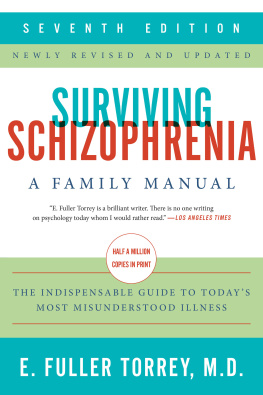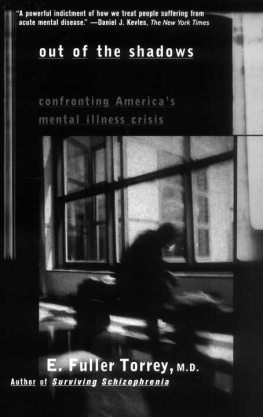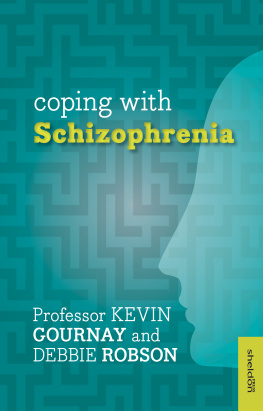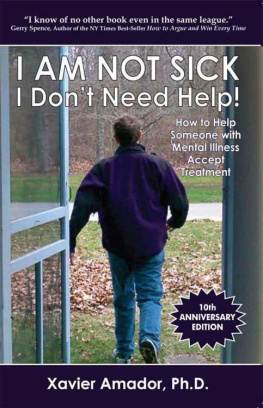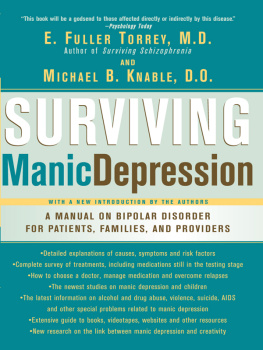As for me, you must know that I shouldnt precisely have chosen madness if there had been any choice.
Vincent Van Gogh, 1889, in a letter to his brother, written while he was involuntarily confined in the psychiatric hospital at St. Remy
This edition of Surviving Schizophrenia is dedicated to the following individuals for their extraordinary efforts to improve the treatment of individuals with severe psychiatric disorders:
Gale Barshop
Matt and Penny Bowman
Liz Browning
John M. Davis, M.D.
Marjorie Findlay
Sylvan C. Herman
Carla and Brian Jacobs
Richard and Ann Madigan
Nancy Merola and the late Paul Merola
Judy Perlman
Sarah Peter
Hattie Segal
Stephen and Patty Segal
Jonathan Stanley
Vada and Ted Stanley
All royalties from this edition have been assigned to the Treatment Advocacy Center.
CONTENTS
Works of art illustrating some symptoms of schizophrenia:
MRIs from identical twins, one with schizophrenia and the other well
Inpatients in Public Mental Hospitals per 100,000 Total Population in the United States, 18301950
The Magnitude of Deinstitutionalization: Number of Patients in Public Mental Hospitals, 19502005
I feel very fortunate to be able to write a sixth edition of this book. Much of what is valuable in the book I learned from individuals with schizophrenia and their families, and to them I am indebted. The fact that the book continues to be widely used in English-speaking countries and has been translated into Spanish, Italian, Russian, Chinese, and Japanese is immensely gratifying.
In the thirty years since the first edition of this book was published, much has changed. The good news is that we now clearly understand that schizophrenia is a disease of the brain, nothing more and nothing less. It is not caused by bad families but by some combination of environmental agents, infectious or otherwise, and predisposing genes. Research has come a long way. At the time the first edition of the book was published, there were fewer than one thousand schizophrenia-related research publications per year, and our annual schizophrenia research meeting had 150 participants. Now there are almost five thousand publications per year, and our research meeting attracts 1,500 participants.
The bad news is that we still do not have definitive treatments. Literally millions of people continue to suffer from the symptoms of schizophrenia on a daily basis, people like my sister, who died in 2010 after having been afflicted for fifty-three years. Worse yet, in the United States we have seen public services for people with severe psychiatric disorders become progressively worse in recent years. The services we are providing to these people now will be regarded in historical retrospect as a scandalous blight on our society. And all of us who are not forcefully speaking out on their behalf must share the blame.
In this edition of Surviving Schizophrenia , I have completely updated the sections on treatments and research and added sections on current issues of special interest, such as the recovery model, health care reform, anosognosia, mental health courts, and assisted outpatient treatment. In order to not lengthen the book, I have necessarily shortened other sections. It is my hope, as I wrote in the preface to the first edition, that this book will continue to help bring schizophrenia out of the Slough of Despond and into the mainstream of American medicine.
This edition of Surviving Schizophrenia is a product of thirty years of felicitous collaboration with HarperCollins. In 1983, Lou AvRutick and Carol Cohen agreed to publish the book as a public service, despite a general belief that nobody would buy a book on schizophrenia. Happily, that proved to be wrong, and over the years the book has been nurtured by Trena Keating, Christine Walsh, Katherine Hill, and, most recently, Gail Winston and Maya Ziv. I am grateful to them all for their professional acumen and personal support.
I am also indebted to those who contributed ideas and corrections to this edition, including Will Carpenter, John Davis, Faith Dickerson, Rosanna Esposito, and especially D. J. Jaffe, for his summary of websites on schizophrenia. Judy Miller again provided valuable administrative support and editorial assistance, as she has for each edition since the second. Most important, I continue to be indebted to my wife, Barbara, for her support and understanding and for the ineffable ingredients that make writing a book possible.
In addition to these, I gratefully acknowledge the following:
P. J. Kavanagh for permission to quote from the Collected Poems of Ivor Gurney.
Joseph H. Berke for permission to reprint excerpts from Mary Barnes: Two Accounts of a Journey Through Madness.
Malcolm B. Bowers and Science Press for permission to reprint excerpts from Retreat from Sanity: The Structure of Emerging Psychosis.
Andrew McGhie and the British Psychological Society for permission to reprint excerpts from an article in the British Journal of Medical Psychology.
British Journal of Psychiatry for permission to reprint excerpts from an article by James Chapman.
Journal of Abnormal and Social Psychology for permission to reprint excerpts from an article by Anonymous.
Anchor Press and Doubleday for permission to reprint excerpts from These Are My Sisters by Lara Jefferson.
Presses Universitaires de France for permission to reprint excerpts from Autobiography of a Schizophrenic Girl by Marguerite Sechehaye.
W. W. Norton and Company for permission to reprint excerpts from In a Darkness by James A. Wechsler.
National Schizophrenia Fellowship for permission to reprint excerpts from Coping with Schizophrenia by H. R. Rollin.
G. P. Putnam and Sons for permission to reprint excerpts from This Stranger, My Son by Louise Wilson.
University Books for permission to reprint excerpts from The Witnesses by Thomas Hennell.
J. G. Hall and Lancet for permission to quote from an article.
Nancy J. Hermon and Colin M. Smith for permission to quote from a presentation at the 1986 Alberta Schizophrenia Conference.
Psychological Bulletin and Schizophrenia Bulletin for permission to quote from articles.
The purpose of this book is to make you aware of the progress of schizophrenia and the possible ways in which it may develop. The assessment of symptoms requires an expert. For proper diagnosis and therapy of all symptoms, real or apparent, connected with schizophrenia, please consult your doctor. In my discussion of cases, I have changed all names and identifying details while preserving the integrity of the research findings.
What then does schizophrenia mean to me? It means fatigue and confusion, it means trying to separate every experience into the real and the unreal and not sometimes being aware of where the edges overlap. It means trying to think straight when there is a maze of experiences getting in the way, and when thoughts are continually being sucked out of your head so that you become embarrassed to speak at meetings. It means feeling sometimes that you are inside your head and visualising yourself walking over your brain, or watching another girl wearing your clothes and carrying out actions as you think them. It means knowing that you are continually watched, that you can never succeed in life because the laws are all against you and knowing that your ultimate destruction is never far away.
Patient with schizophrenia, quoted in Henry R. Rollin, Coping with Schizophrenia
When tragedy strikes, one of the things that make life bearable for people is the sympathy of friends and relatives. This can be seen, for example, in a natural disaster like a flood and with a chronic disease like cancer. Those closest to the person afflicted offer help, extend their sympathy, and generally provide important solace and support in the persons time of need. Sympathy, said Emerson, is a supporting atmosphere, and in it we unfold easily and well. A prerequisite for sympathy is an ability to put oneself in the place of the person afflicted. One must be able to imagine oneself in a flood or getting cancer. Without this ability to put oneself in the place of the person afflicted, there can be abstract pity but not true sympathy.


